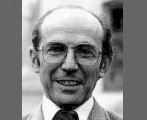
Jan Milič Lochman was born on April 3, 1922 in Nove Mesto nad Metuji, Czechoslovakia, and died at age of 81 on January 21, 2004. During the Second World War and after, he studied theology in Prague, St. Andrews and Basel. He was ordained a minister in the Evangelical Church of Czech Brethren and served as assistant pastor in Kladno. In 1950, he was appointed as a professor at the Comenius Faculty of Protestant Theology in Prague and a warden (or chaplain) at the Hus Seminary. He taught philosophy of religion and systematic theology.
After the Soviet occupation of Czechoslovakia in 1968, Lochman and his family moved to New York. After a year at Union Theological Seminary, he was appointed to a chair in Basel, where he taught sys-tematic theology. Many theological and doctoral students flocked to Basel because of him. In the 1980s, he became the Rector (president) of the university, a position he filled until his retirement.
His books include a trilogy on the ten commandments, the creed, and the Lord’s prayer, which was translated into several languages. He studied the Czech Reformation and J.A. Comenius and distinguished himself in the interpretation of 20th-century theologians such as Barth and Bonhoeffer. In 1987, he received the Jacob Burckhardt International Prize for Humanities.
Lochman chaired the theology department of the World Alliance of Reformed Churches from 1970-1982. From 1968 to 1975 he was a member of the World Council of Churches (WCC) central and executive committees. Among his books that have been translated into English are: Christ and Prometheus? A Quest for Theological Identity (1988); Encountering Marx: Bonds and Barriers between Christians and Marxists (1977); The Faith We Confess: An Ecumenical Dogmatics (1984); Living Roots of the Reformation (1979); The Lord’s Prayer (1990); and Zeal for Truth and Tolerance: The Ecumenical Challenge of the Czech Reformation (1996). A compilation of his essays and articles was published under the title Das radikale Erbe (The Radical Legacy).
-MR
